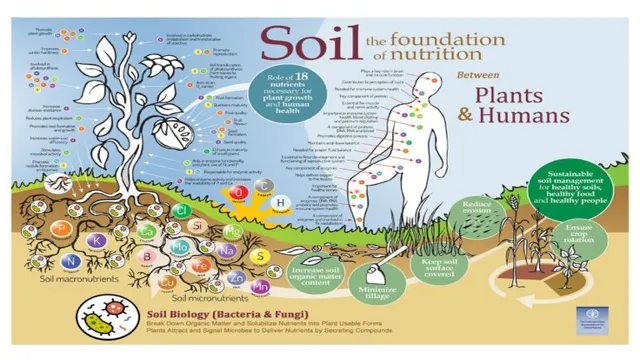Unleashing the hidden power of soil is no longer a mystery, thanks to innovative soil addons that have revolutionized agriculture. In this blog post, we delve into the fascinating world of soil health enhancement methods that not only promise outstanding benefits for crop yield but also contribute significantly to sustainable farming. Unearth the secrets of soil health, discover sustainable farming practices, and learn how to nourish your soil in ways that benefit our planet.
This is not just about making your garden bloom; it’s about embracing a holistic approach to boost soil health, ensuring a greener and healthier future for all. Welcome to the journey of transforming soil health using addons, a ride that promises to be as informative as it is enlightening.
Table of Contents
Understanding Soil Health
The Significance of Soil Health Addons The foundation of any flourishing garden or productive agricultural land is healthy soil. The term ‘soil health’ is often bandied about in horticultural and agricultural circles, but what exactly does it mean? Simply put, soil health refers to the condition of the soil in relation to its capability to sustain plant, animal, and human life healthily and productively. Soil health addons are an integral part of maintaining and enhancing this balance.
They are natural or synthetic supplements used to enrich the soil, improving its physical properties and biodiversity. These additives can range from compost, manure, and organic matter to synthetic fertilizers, each designed to boost the soil’s nutrient content and bolster its fertility. The addition of soil health add-ons is akin to taking multivitamins for humans – they supplement the soil’s natural nutrients, ensuring that plants have all they need to develop robustly.
Through the strategic use of these additives, we can enhance soil health, leading to more vigorous plant growth, increased crop yields, and, ultimately, more sustainable agricultural practices. Understanding soil health add-ons is a critical step toward promoting and enhancing the productivity and sustainability of our gardens and farmlands. After all, our survival is deeply interconnected with the health of the soil.
Importance of Soil Health
Soil health add-ons are essential tools in the quest to improve soil fertility and productivity. These tools, often consisting of natural supplements or beneficial microorganisms, are vital for enhancing soil structure, nutrient content, moisture retention, and overall soil health. By investing in soil health add-ons, we not only ensure the longevity and effectiveness of our farming practices but also contribute to sustainable agriculture and environmental preservation.
In essence, they are the unsung heroes, quietly bolstering the health of our soil and, ultimately, the quality and quantity of our harvests.

Factors Affecting Soil Health
Determining the optimum health of soil is not a simplistic process but rather one that involves intricate factors. One key player in the health game is the use of soil health addons, which are supplements designed to enhance the soil’s fertility and productivity. These add-ons can range from organic compost to synthetic fertilizers.
However, soil health isn’t solely reliant on these additives. Elements like climate and topography also impact it and the type of organisms present. Soil health, therefore, is a dynamic concept influenced by a multitude of factors that require careful management and thoughtful consideration.
Introduction to Soil Addons
Soil health is the cornerstone of a thriving garden, and like any thriving ecosystem, it requires a delicate balance of nutrients, minerals, and organic material. Enter soil health add-ons, the unsung heroes of the gardening world. Think of these add-ons as vitamin supplements for your garden, providing a targeted boost of specific nutrients to help your soil flourish.
Soil health addons come in various forms, from organic composts teeming with beneficial microbes to specially formulated fertilizers designed to balance your soil’s pH levels. Each addon serves a unique purpose, and the key is knowing what your soil needs to reach its full potential. For instance, if your soil is lacking in organic material, a compost addon can introduce a rich diversity of nutrients, promoting the growth of beneficial soil organisms and improving soil structure.
On the other hand, if your soil is too acidic, a lime addon can help neutralize the pH, making it more hospitable for plant growth. In the grand scheme of gardening, soil health add-ons may seem like a minor detail. However, they play a pivotal role in cultivating a vibrant and productive garden.
By understanding their role and employing them strategically, you can significantly enhance the versatility and vitality of your soil. So, in essence, soil health add-ons are not just the unsung heroes but the secret superheroes of the gardening world, tirelessly working beneath the surface to create optimal conditions for plant growth.
What are Soil Addons?
Soil health add-ons, often referred to as soil amendments, are substances added to soil to enhance its physical properties and bolster plant growth. These soil enhancers are like multivitamin supplements for your garden, providing necessary nutrients and improving soil structure. Whether you are a seasoned gardener or a beginner, understanding the role of soil health addons can be a game-changer.
They can help you transform even the most stubborn soil into a fertile oasis, encouraging vigorous plant growth and ensuring the overall vitality of your garden. So, let’s delve into the world of soil health add-ons and unravel their magic.
Types of Soil Addons
In the quest for a flourishing garden, soil health addons play a crucial role. These magic potions, available in various forms, enrich your soil with the necessary nutrients, improving its structure and fertility. From organic compost teeming with beneficial microorganisms to lime that corrects acidic conditions, these soil health additives are essential for rejuvenating tired, nutrient-depleted soil.
There are also biochar additives that sequester carbon and enhance water retention, or the classic manure, packed with rich, organic matter. Each type is a testament to the art and science of gardening, contributing to the creation of a verdant, bountiful oasis.
Benefits of Using Soil Addons
Enhancing soil health is critical for sustainable agriculture and robust plant growth. Soil health addons, the unsung heroes of optimal gardening, offer numerous benefits. These additives enrich the soil with essential nutrients, improve its structure, enhance water retention, and promote beneficial microbial activity.
Additionally, they aid in balancing the soil’s pH level and improving its fertility. In other words, soil health add-ons are like the multivitamins for your garden, helping it to flourish and thrive. Indeed, they are an indispensable tool for every gardener or farmer looking to achieve a lush, bountiful harvest.
| Aspect of Soil Health | Key Indicators | Importance |
|---|---|---|
| Soil pH | pH level between 6.0 and 7.0 is ideal for most crops. | pH affects nutrient availability and microbial activity. |
| Organic Matter Content | High organic matter content (>3%) is desirable. | Organic matter improves soil structure, water retention, and nutrient cycling. |
| Nutrient Levels | Adequate levels of macronutrients (N, P, K) and micronutrients. | Essential for plant growth and crop yield. |
| Soil Texture | Balanced mix of sand, silt, and clay particles. | Influences water retention, drainage, and aeration. |
| Soil Moisture | Consistent moisture levels without waterlogging. | Critical for plant growth and root development. |
| Soil Compaction | Low soil compaction, allowing for root penetration. | High compaction restricts root growth and water infiltration. |
| Biodiversity | Diverse microbial and macroorganism populations. | Supports nutrient cycling and disease suppression. |
| Erosion Control | Minimal erosion, loss of topsoil, and sediment runoff. | Prevents soil degradation and water pollution. |
| Soil Testing | Regular soil testing and analysis. | Provides insights into nutrient levels and necessary amendments. |
| Cover Crops | Use of cover crops to prevent erosion and improve soil health. | Adds organic matter and prevents nutrient leaching. |
Choosing the Right Soil Addons
A Guide to Choosing the Right Addons A vibrant, nutrient-rich soil is the cornerstone of a flourishing garden. The quality of your soil directly impacts the vitality of your plants and their resilience against pest infestations and diseases. However, not all soils are created equal.
Whether your garden soil is sandy, clayey, or somewhere in between, there’s always room for improvement. This is where soil health addons come into play. These additives, often called soil amendments, are substances you can add to your soil to enhance its physical properties, including texture, density, and nutrient content.
The right add-ons can significantly boost your soil health, providing an ideal environment for your plants to thrive. Choosing the right soil health add-ons, however, can be a daunting task. The market is flooded with a myriad of options, each boasting unique benefits.
To make an informed decision, it’s crucial first to understand your soil’s current condition and what it lacks. A soil test is an excellent starting point. It will reveal your soil’s pH level, nutrient content, and texture, all of which are critical factors in determining the appropriate addons.
For instance, if your soil is too acidic, you might need to add lime to balance the pH level. If it lacks vital nutrients, compost or manure could be the solution. Remember, there’s no one-size-fits-all solution when it comes to soil health addons.
A product that works wonders for your neighbor’s garden might not yield the same results for yours. It’s all about finding what works best for your unique soil composition and the specific needs of your plants. To sum it up, enhancing soil health is not just about adding more nutrients.

Considerations When Selecting Addons
Choosing the right soil health add-ons can be a game-changer for your garden’s wellness. But with a myriad of options, the selection process can be a bit overwhelming. The key lies in understanding your soil’s unique needs and matching them with the correct additives.
Whether it’s organic matter to improve soil structure or specific nutrients to enhance fertility, the right addon can revolutionize your garden’s productivity. So, take the time to delve into the world of soil health add-ons, and your plants will thank you for it! Let’s turn that brown thumb green!
Popular Soil Addons and Their Uses
Keeping your garden’s soil health in tip-top shape is crucial for the growth and development of your plants. Luckily, there are numerous soil health addons available in the market that can significantly boost your garden’s productivity. From organic compost, known for enriching soil with essential nutrients, to biochar, which enhances water retention and reduces soil acidity, each addon has its unique benefits.
Moreover, green manure helps in soil conditioning, while mycorrhizal fungi increase nutrient uptake. These popular soil addons, when applied correctly, can transform your garden into a thriving oasis of greenery.
Applying Soil Addons
Enhancing Your Garden’s Vitality: A Guide to Applying Soil Health Addons In the quest for a flourishing garden, soil health proves to be an indispensable factor. The vitality of your garden is intrinsically linked to the well-being of its soil, and thus, incorporating soil health add-ons can be the game-changer you’ve been seeking. These add-ons, also known as soil amendments or soil conditioners, function as enriching supplements that bolster the fertility and structure of your soil.
They are a garden’s secret weapon, working behind the scenes to enhance the soil’s capacity to retain water and nutrients, stimulate plant root development, and encourage beneficial microbial activity. From organic matter like compost and manure to specific mineral additives like lime or gypsum, soil health add-ons come in a wide array of forms. Each type serves a unique purpose, tailored to address specific soil deficiencies and improve overall soil health.
However, incorporating these amendments requires a certain level of caution and precision. Overuse or misuse can adversely impact your soil’s balance and, by extension, your plants’ health. It’s crucial to understand your soil’s specific needs before introducing any additives.
Soil tests can provide useful insights into the soil’s pH and nutrient levels, guiding your choice of soil health addons. Once you’ve identified your soil’s needs, it’s time to apply the chosen add-ons. The process typically involves evenly spreading the amendments over the soil surface and then working them into the soil with a garden tiller or spade.
It’s recommended to apply soil health addons in the fall or early spring, giving them ample time to integrate with the soil before the main growing season. In conclusion, soil health add-ons can prove to be powerful tools in your gardening arsenal, aiding in the creation of a fertile, resilient soil environment. By understanding and catering to your soil’s specific needs, you can harness the full potential of these amendments, leading your garden on a path to abundant growth and vitality.
Conclusion
Soil health add-ons are the multi-vitamins of the gardening world. They boost the nutritional profile of your soil, ensuring that your plants get a well-rounded diet for optimal growth. So, if your plants are looking a little under the weather, it might be time to give them a soil health add-on boost. After all, healthy soil is like a five-star restaurant for plants; it provides all the delicious nutrients they crave in a form they can easily digest. So, remember – the secret to a flourishing garden is right beneath your feet!
Frequently Asked Questions [FAQs]
1. What are some effective soil health add-ons?
Some effective soil health add-ons include organic compost, biochar, mycorrhizal fungi, worm castings, green manure crops, and natural soil amendments like rock dust.
2. How do soil health add-ons enhance the quality of soil?
Soil health add-ons enrich the soil with essential nutrients and beneficial organisms. They improve the soil structure, enhance its water-holding capacity, and promote biological activity, which in turn, boosts plant growth and resilience to diseases.
3. Can you explain the role of biochar as a soil health addon?
Biochar is a type of charcoal that improves soil health by enhancing its nutrient retention capacity, reducing soil acidity, and providing habitat for beneficial soil organisms. It also helps in carbon sequestration, thus mitigating climate change.
4. What is the importance of mycorrhizal fungi as a soil health addon?
Mycorrhizal fungi form symbiotic relationships with plant roots, helping them absorb more water and nutrients from the soil. They also improve soil structure and fertility, enhance plant resilience to stress, and contribute to biodiversity in the soil ecosystem.
5. How often should soil health add-ons be applied to the soil?
The frequency of application depends on the type of soil health addon and the specific needs of the soil and plants. For instance, compost can be added annually, while biochar is usually a one-time application. It’s best to perform a soil test to determine what your soil needs and consult with a soil health expert.
6. Are there any negative impacts of overusing soil health addons?
While soil health add-ons generally benefit the soil, overuse can lead to an imbalance of nutrients, which may harm plant growth. Some soil amendments can also alter the soil pH levels if used excessively. Therefore, it’s important to use these addons judiciously and according to the recommended amounts.

Leave a Reply